Corsair's Force SSD Reviewed: SF-1200 is Very Good
by Anand Lal Shimpi on April 14, 2010 2:27 AM ESTOverall System Performance using PCMark Vantage
Next up is PCMark Vantage, another system-wide performance suite. For those of you who aren’t familiar with PCMark Vantage, it ends up being the most real-world-like hard drive test I can come up with. It runs things like application launches, file searches, web browsing, contacts searching, video playback, photo editing and other completely mundane but real-world tasks. I’ve described the benchmark in great detail before but if you’d like to read up on what it does in particular, take a look at Futuremark’s whitepaper on the benchmark; it’s not perfect, but it’s good enough to be a member of a comprehensive storage benchmark suite. Any performance impacts here would most likely be reflected in the real world.
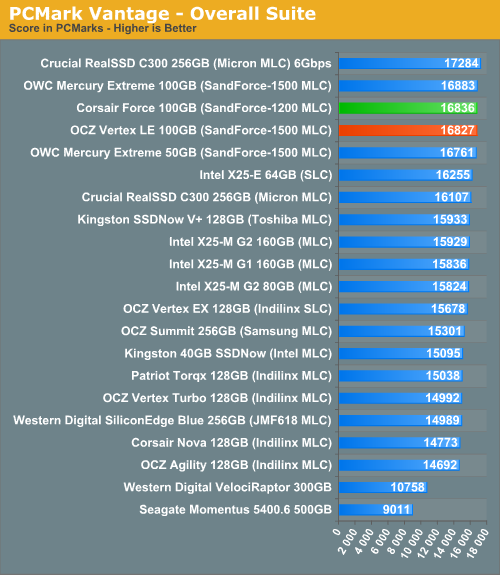
Real world performance is very competitive. Corsair's Force is easily in the top 3 for best performing SSDs on the market today.
The memories suite includes a test involving importing pictures into Windows Photo Gallery and editing them, a fairly benign task that easily falls into the category of being very influenced by disk performance.
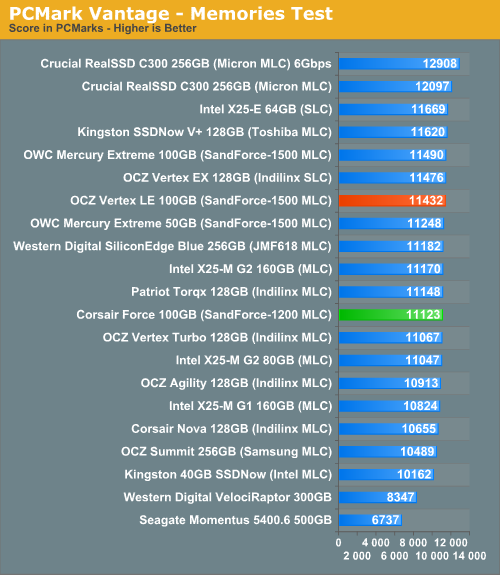
The TV and Movies tests focus on on video transcoding which is mostly CPU bound, but one of the tests involves Windows Media Center which tends to be disk bound.
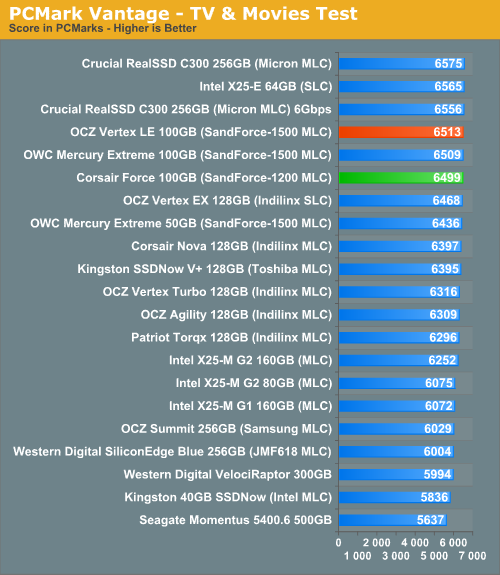
The gaming tests are very well suited to SSDs since they spend a good portion of their time focusing on reading textures and loading level data. All of the SSDs dominate here, but as you'll see later on in my gaming tests the benefits of an SSD really vary depending on the game. Take these results as a best case scenario of what can happen, not the norm.
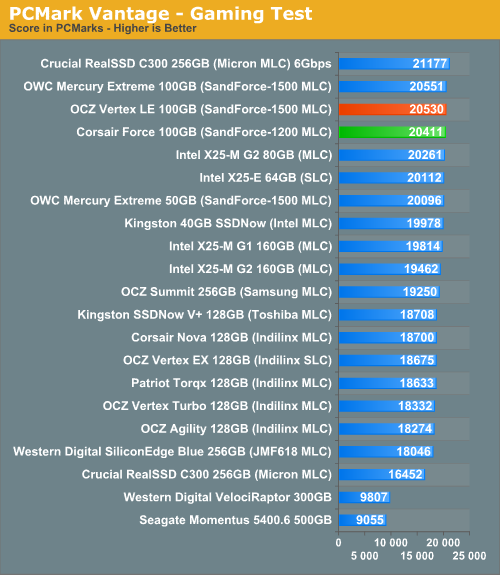
In the Music suite the main test is a multitasking scenario: the test simulates surfing the web in IE7, transcoding an audio file and adding music to Windows Media Player (the most disk intensive portion of the test).
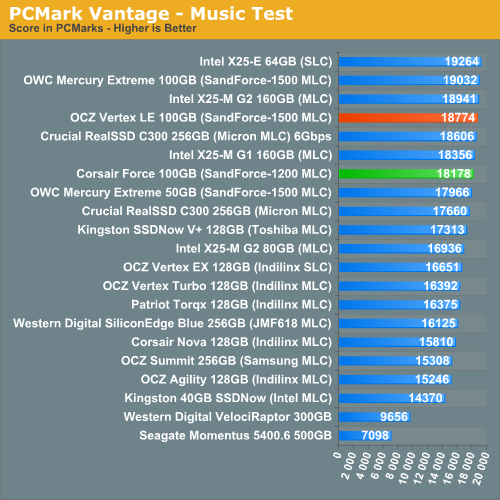
The Communications suite is made up of two tests, both involving light multitasking. The first test simulates data encryption/decryption while running message rules in Windows Mail. The second test simulates web surfing (including opening/closing tabs) in IE7, data decryption and running Windows Defender.
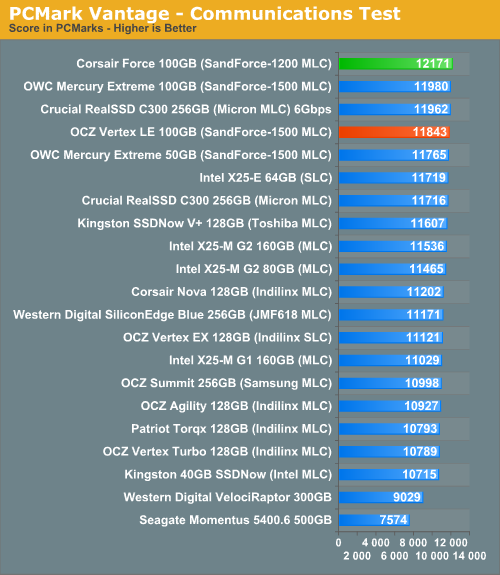
I love PCMark's Productivity test; in this test there are four tasks going on at once, searching through Windows contacts, searching through Windows Mail, browsing multiple webpages in IE7 and loading applications. This is as real world of a scenario as you get and it happens to be representative of one of the most frustrating HDD usage models - trying to do multiple things at once. There's nothing more annoying than trying to launch a simple application while you're doing other things in the background and have the load take forever.
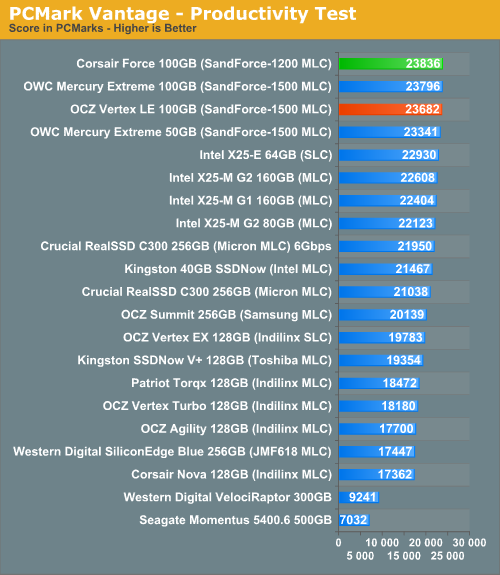
The final PCMark Vantage suite is HDD specific and this is where you'll see the biggest differences between the drives:
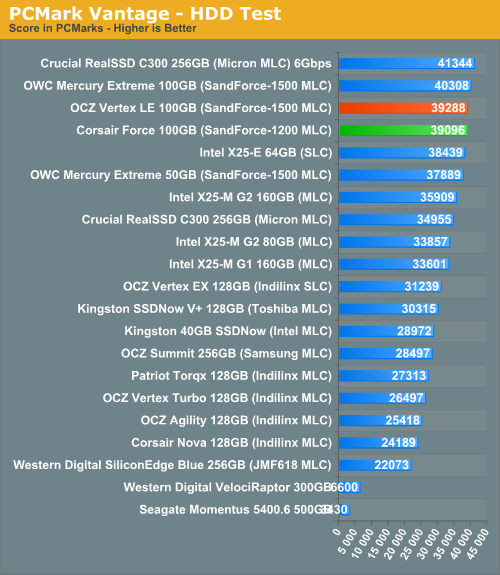










63 Comments
View All Comments
marc_soad - Thursday, April 15, 2010 - link
If I'm not wrong, what the author means is 2 000 000 hours = 83 333 days = 228 years.So the drive is meant to fail after 228 years if it's powered on all the time, or more if the computer is powered on only for a portion of the day.
Thanks for the review by the way! :)
p05esto - Friday, April 16, 2010 - link
Hey, I COMPLETELY agree with the printing thing....I hate articles that have "pages", I'd rather view a 10 page long single document....yes, I'm that frickin lazy. You shouldn't remove the pages, but offer a FULL view option? I use the print option sometimes as well just to read an article all at once.poee - Friday, July 16, 2010 - link
"Performance is down, as you'd expect, but not to unbearable levels and it's also pretty consistent."Why is performance down? Why should we "expect" this? Do I have to read every SSD article you've written previously to understand new articles? Or is there one big article that has all the info that you obliquely allude to in subsequent articles?
Where can I find the current recommendations for SSDs (SandForce vs Indilinx vs Intel vs Micron vs Samsung, latest firmware updates, etc.)? Is there a central repository of SSD information that is assimilated and arranged categorically (for easy research), or must all this info be followed like a blog?